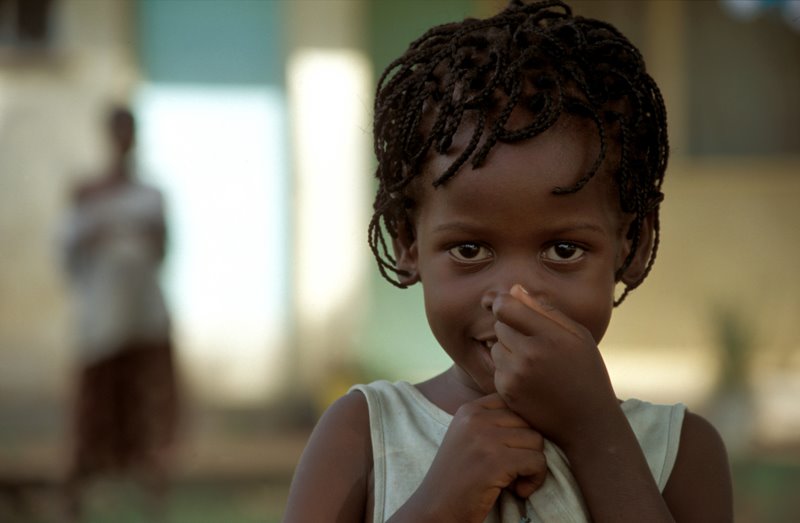In Uganda, AIDS-infected mothers have begun writing what they call
Memory Books for their children.
Henning Mankell:
“These Memory Books, these little booklets with pasted in pictures
and stories, written by people who hardly know the alphabet, could in many ways be one of the most important documents of our time.”.
In front of the small brick house Dennis and Chrissi brush their teeth every evening in the dim glow of the oil lamp. The 10-year-old watches his little sister conscientiously as they get ready for bed. Since their mother died of AIDS two years ago they are both orphans, two of more than two million of their kind in Uganda. There are few countries in Africa that have more households run by orphaned children and, despite extensive efforts by the government to raise awareness, experts on the subject predict that nearly 35% of Uganda's population is infected with HIV. When the parents die, the children are forced to look after themselves.
A very special project has emerged in Uganda as a result:
Memory Books,
written by infected parents, mostly mothers, and their children. Aware of the illness, it is a way for the family to come to terms with the inevitable death that it faces. Openly, honestly and compassionately, the books give the children a chance to prepare themselves for life on their own. Values and traditions are passed on in the form of stories, fairytales and songs and the family’s history is recorded with the children's favorite memories or their parent's wishes for the future.
The books not only capture immeasurably valuable memories, but also allow members of the family to process some gruesome realities and prepare for the future. Hopelessness and desperation are confronted through the collaborative effort of remembering and recording, a process that inspires unexpected strength and even solace in the face of death. These books will likely be the most important guidelines that these orphans have to lead them through life.
A film by Christa Graf
Memory Books
Dennis is crouching next to Christine the nurse. His eyes are full of sadness and as he cries he explains that since his mother’s passing he has nobody to look after him.
Every time I think of her I cry. He speaks very softly and with long pauses. Christine is holding his hand. We used to talk a lot with each other. When she got sick I used to give her her medicine. He tries to pull himself together, wiping the tears from his face. He and Chrissi leaf through their Memory Book on their laps. As we were writing it, Mama always said that the book would help us at some point. Now I know what she meant. It really does help us. It helps us remember all of the good things that she did for us. When I read to Chrissi from the book it’s as if she is talking to us.
Harriet is the mother of three children. She lives with the Co-wife of her husband and is already writing her third Memory Book. Christine, the nurse, found out four years ago that she herself was infected. Since then she has been teaching other mothers how to write in their Memory Books. Betty, for example, can neither read nor write.
She dictates to her oldest son who is writing in the book for little Lucy, the youngest of five. The film guides you through her daily routine. They are individual destinies indicative of the problems in the heart of Africa but, more importantly, they suggest a remedy for the sadness.
Classified by the German Film Board as Outstanding: “Memory Books is unquestionably one of the best documentaries currently being released. Unlike many of the films so carelessly labeled 'important', this film actually deserves to be called just that: Important.”
www.memorybooks-film.com
Crew:
Author and Director: Christa Graf
Cinematographer: Roland Wagner
Editor: Carmen Kirchweger
Sound Mixer: Ralf Richter
Composer: Gert Wilden Jr.
Co-Producer: Markus Fischer snakefilm GmbH
Commissioning Editor: Anne Even (ZDF arte), Urs Augstburger (SF), Alberto Chollet (SRG SSR idee suisse)
Producer: Jörg Bundschuh, Kick Film GmbH
Film facts: HD Cam, Digital, 16:9
Lenght: 90 Min., 52 Min.
Participating TV-Stations: ZDF arte, SF (Switzerland)
German Film Board: Prädikat besonders wertvoll (rated especially valuable)
Festival Invitations: Hot Docs Toronto
FIPA Biarritz
Int. Panafrican Film Festival Montreal
Solothurner Filmtage
DOK FEST Muenchen
Awards: Prix des Jeunes Europèens, Honour Prize Berlin Film Ball
Book published by: MALIK Verlag Muenchen
Supported by: BKM, MfG, DFFF, Volkart Stiftung, EED
Company:
Kick Film GmbH Mannhardtstr. 6, 80538 Muenchen
www.kickfilm.com
Tel:+49-(0)89-747103-0
Fax: +49-(0)89-747103-66
Dienstag, 15. April 2008
Abonnieren
Kommentare (Atom)
